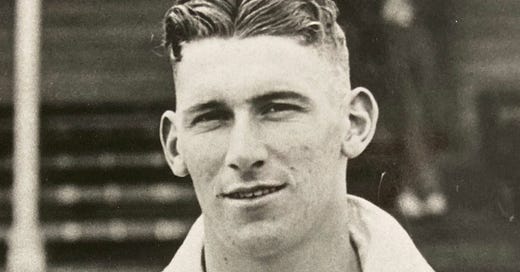For many years, one of the loneliest statistics in the annual editions of the venerable Cricket Almanack of New Zealand has been that belonging to A.E. Moss, the Canterbury bowler who, in the 1889-90 season, playing against Wellington in Christchurch, took 10-28 in an innings.
Moss' achievement hid an even more fascinating background that was unearthed by former New Zealand selector and cricket historian the late Don Neely. He uncovered the tragedy and redemption that was Moss' life, a victim of alcoholism who later reformed and spent his life in service to the Salvation Army, a story told in his book of photos and stories The Summer Game published as part of New Zealand Cricket's centennial.
In the season of 2021-22, spinner Ajaz Patel became the second New Zealander to take 10 wickets in an innings, with 10 for 119 against India at Mumbai.
However, because of the frustrations of warfare and the loss of first-class status, Moss may not have been quite so alone for so long.
Tom Pritchard
New Zealand fast bowler Tom Pritchard, who had been left out of the 1937 touring team to England, a decision regarded as a selection failure in the wake of the tour, demonstrated his effectiveness with the ball in February 1943.
Playing for the Central Military District XI against their Northern Military District counterparts at the Basin Reserve, the Central side scored 136 when batting first. But any hopes that the Northern side might surpass that were undone by Pritchard.
The side included two players, G.L. 'Dad' Weir and D.D. 'Don' Taylor, who had or would achieve Test status. Weir had toured with both the 1931 and 1937 New Zealand teams to England, while Taylor, after playing with Pritchard for Warwickshire in England county cricket, played in New Zealand's first winning Test side against the West Indies in 1956.
Pritchard sent down 12 overs for 39 runs, bowling nine of his victims, the 10th, Auckland stalwart Alf Postles, being trapped lbw.
The Dominion described Pritchard's spell,
Pritchard's feat was accomplished through great accuracy and a skilful disguising of pace, most of the beaten Northern batsmen making their strokes after the ball had gone. He also made the ball break sharply from the off at times, specially with shorter-pitched balls.[1]
Central scored 254 in its second innings and required the Northern side to score 314 to win. It found the conditions more suitable and Pritchard less dangerous in only taking two for 89 from 22.3 overs, 1937 New Zealand tourist Jack Lamason doing best with 4-86 as the Northern side got home by two wickets.
Pritchard, who had taken a 10-wicket bag in Palmerston North club cricket, recalled the game to his biographer, Paul Williams.
I remember the match well. After five overs I said to Jack [Lamason] that I'd had enough. I had been based at Waiouru and hadn't played much cricket at all, and wasn't very match fit. Five overs seemed like a good spell.
He asked me to bowl one more over, and there was another wicket. Then he said, 'One more over', and there was another wicket. Then he said, 'One more over', and there was another wicket, and that's how it went on.[2]
Pritchard left soon after for the Italian campaign, but not before making his mark in games in Egypt while preparing for heading to Italy.
At the war's end, there was a rumour that Pritchard had skipped the New Zealand forces to live in England.
However, he later explained to veteran New Zealand journalist T.P. 'Terry' McLean that at the end of hostilities, English cricketer Tom Dollery, who would be his future county captain, invited Pritchard to join an English Army team that would play games in England during the remainder of the summer.
While playing one of these games, Pritchard found himself in the company of General Bernard Freyberg, who had commanded the 2nd NZ Division throughout the way.
General Freyberg asked me if I wanted to stay in England to play cricket. I said I did. He thereupon gave me permission to demobilise in the UK. Somehow, he failed to tell anyone in the Kiwi Division. That's how the rumour started that I had skedaddled.[3]
Once he had qualified, Pritchard enjoyed a productive career with Warwickshire between 1946 and 1955. He made his debut in his solitary appearance against India in 1946, and after qualifying for 1947, went on to take 695 wickets for the county, still 14th highest on Warwickshire's all-time list.
His best season for the county was in 1948, taking 170 wickets.
In 1956, he played four games as an amateur for Kent, adding 11 wickets to those he took for Warwickshire.
Pritchard told McLean,
Cricket was different then. The most I ever earned was 12 pound a week. When you were playing another team, you spent most of your spare time with them.
I have the warmest memories of our great players before and after the war – [Martin] Donnelly, who also played for Warwickshire, Mervyn Wallace, Bert Sutcliffe, great batsmen all. Lindsay Weir, as nice a man as you could ever meet, was another.[4]
Pritchard, played 200 first-class games and took 818 wickets at 23.30, and scored 3363 runs at 13.34. He died in Levin in 2017 at the age of 100.
[1] The Dominion, 13 February 1943
[2] Tom Pritchard, quoted by Pau Williams in Tom Pritchard, Greatness Denied, Trio Books, Wellington, 2013
[3] Tom Pritchard, interviewed by T.P. McLean, NZ Herald, date unknown
[4] ibid



